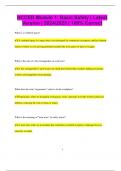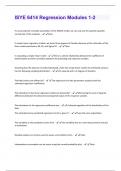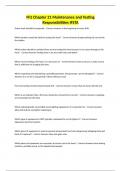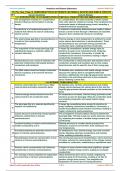The creation of the Supreme Court in the UK:
Before the Constitutional Reform Act 2005, there were 12 Law Lords who made
up the Appellate Committee of the House of Lords, the highest UK court, and sat
in the House of Lords as full members. The head of the Judiciary was the Lord
Chancellor who was also the Speaker of the House of Lords, making him an
important member of the legislature, and a cabinet minister responsible for the
management of the UK legal system. The Judiciary were accused of lacking
independence/neutrality.
In October 2009, The Supreme Court replaced the Appellate Committee of the
House of Lords as the highest court in the United Kingdom. The new head of the
Judiciary became a non-political figure known as Lord Chief Justice, and members
of the Supreme Court were barred from sitting and voting in the House of Lords
for as long as they remained Justices.
What is the role of the Supreme Court?
The Supreme Court is an appellate court and the highest court of appeal in the
UK.
1. Ensuring the rule of law is applied. The rule of law - the principle that all
members of the population should be treated equally under the law - is one of
A.V Dicey’s twin pillars of the UK Constitution. The Supreme Court may accept
appeals on the grounds of irrationality, illegality (unlawfulness) or procedural
impropriety (unfairness or bias).
2. Interpretation of the law. The Supreme Court clarifies how laws in the UK
should be interpreted when the meaning or intention behind a law is unclear. The
decisions of the Supreme Court set judicial precedent that other judges must
follow.
3. Conducting judicial review. When members of the population feel they have
been mistreated by a public body they can appeal to the Supreme Court, for
example where government or a public body have exceeded their statutory
powers by acting ‘ultra vires’. Judicial review ensures that the government does
not overstep their powers and also asserts the rights of citizens.
What is the composition of the Supreme Court?
How are Supreme Court justices appointed?
A vacancy can arise in the Supreme Court when a Justice dies, retires or reaches
the age of 75.
Historically, Supreme Court justices were appointed by the monarch on the
advice of the PM and the Lord Chancellor. These appointments would then be
finalised through secret soundings where the Lord Chancellor gauged the opinion
of associates and other members of the Judiciary. This process lacked
transparency and neutrality.
Now when a vacancy arises, a five-member selection commission is convened to
consider possible nominees and make a ‘selection’ based on merit. The
commission submits a report to the Lord Chancellor identifying a nominee who
they can reject once. The Lord Chancellor accepts the selection by ‘notifying’ the
, Prime Minister who must then recommend the candidate to the Queen for formal
approvement.
This is now a genuine meritocracy. Possible candidates require fifteen years of
experience within the Judiciary, ensuring proper qualifications and expertise.
What is the potential problem with a meritocracy like this? It is
exclusionary, as it prevents people who may be equally capable, but lacked the
same opportunities, from becoming a Justice. Almost all of the Supreme Court
Justices are white, male and Oxbridge educated. As of April 2022, nine of the ten
justices are male, nine of the ten went to Oxbridge and all ten are white.
Furthermore, requiring 15 years of experience leads to a lack of youth
representation.
Judicial independence
Judges should be free from political control and not influenced by other branches
of government. There should be no fear of consequences for doing the right
thing.
Ways that independence is ensured:
1. Security of tenure means that judges cannot be removed from office on
the grounds of the decisions they make, only for exceptional
circumstances like corruption. This means that politicians cannot influence
with threats to sack or suspend them, and Judges are free to make
decision without fear of dismissal, even if such decisions offend the
government.
2. Guaranteed salaries paid from a consolidated fund and decided by an
independent review body. As Judges are always paid automatically from
the fund, politicians cannot manipulate salaries as a means of influence.
3. The sub judice rule means that MPs, Lords and the media are barred
from intervening in or commenting on a current court case. They can face
contempt of court if they do so which removes political pressure being
placed on Judges.
4. Growing separation of powers since 2009 - the downgrading of Lord
Chancellor’s post and creation of new UK supreme court enhanced
separation. Law Lords and Lord Chancellor used to hold influential
positions in multiple branches.
5. Independent appointments system - Constitutional Reform Act 2005
saw creation of Judicial Appointments Commission (JAC). Greater
transparency and less political bias.
Judicial neutrality
Judges should act impartially without bias or be influenced from their personal
political opinions.
Ways that neutrality is ensured:
1. Justices will recuse, or excuse, themselves from a case when there is a
potential conflict of interest or lack of impartiality.
2. All judges must provide legal justifications for their judgements
ensuring that all decisions are rooted firmly in law, rather than via
Before the Constitutional Reform Act 2005, there were 12 Law Lords who made
up the Appellate Committee of the House of Lords, the highest UK court, and sat
in the House of Lords as full members. The head of the Judiciary was the Lord
Chancellor who was also the Speaker of the House of Lords, making him an
important member of the legislature, and a cabinet minister responsible for the
management of the UK legal system. The Judiciary were accused of lacking
independence/neutrality.
In October 2009, The Supreme Court replaced the Appellate Committee of the
House of Lords as the highest court in the United Kingdom. The new head of the
Judiciary became a non-political figure known as Lord Chief Justice, and members
of the Supreme Court were barred from sitting and voting in the House of Lords
for as long as they remained Justices.
What is the role of the Supreme Court?
The Supreme Court is an appellate court and the highest court of appeal in the
UK.
1. Ensuring the rule of law is applied. The rule of law - the principle that all
members of the population should be treated equally under the law - is one of
A.V Dicey’s twin pillars of the UK Constitution. The Supreme Court may accept
appeals on the grounds of irrationality, illegality (unlawfulness) or procedural
impropriety (unfairness or bias).
2. Interpretation of the law. The Supreme Court clarifies how laws in the UK
should be interpreted when the meaning or intention behind a law is unclear. The
decisions of the Supreme Court set judicial precedent that other judges must
follow.
3. Conducting judicial review. When members of the population feel they have
been mistreated by a public body they can appeal to the Supreme Court, for
example where government or a public body have exceeded their statutory
powers by acting ‘ultra vires’. Judicial review ensures that the government does
not overstep their powers and also asserts the rights of citizens.
What is the composition of the Supreme Court?
How are Supreme Court justices appointed?
A vacancy can arise in the Supreme Court when a Justice dies, retires or reaches
the age of 75.
Historically, Supreme Court justices were appointed by the monarch on the
advice of the PM and the Lord Chancellor. These appointments would then be
finalised through secret soundings where the Lord Chancellor gauged the opinion
of associates and other members of the Judiciary. This process lacked
transparency and neutrality.
Now when a vacancy arises, a five-member selection commission is convened to
consider possible nominees and make a ‘selection’ based on merit. The
commission submits a report to the Lord Chancellor identifying a nominee who
they can reject once. The Lord Chancellor accepts the selection by ‘notifying’ the
, Prime Minister who must then recommend the candidate to the Queen for formal
approvement.
This is now a genuine meritocracy. Possible candidates require fifteen years of
experience within the Judiciary, ensuring proper qualifications and expertise.
What is the potential problem with a meritocracy like this? It is
exclusionary, as it prevents people who may be equally capable, but lacked the
same opportunities, from becoming a Justice. Almost all of the Supreme Court
Justices are white, male and Oxbridge educated. As of April 2022, nine of the ten
justices are male, nine of the ten went to Oxbridge and all ten are white.
Furthermore, requiring 15 years of experience leads to a lack of youth
representation.
Judicial independence
Judges should be free from political control and not influenced by other branches
of government. There should be no fear of consequences for doing the right
thing.
Ways that independence is ensured:
1. Security of tenure means that judges cannot be removed from office on
the grounds of the decisions they make, only for exceptional
circumstances like corruption. This means that politicians cannot influence
with threats to sack or suspend them, and Judges are free to make
decision without fear of dismissal, even if such decisions offend the
government.
2. Guaranteed salaries paid from a consolidated fund and decided by an
independent review body. As Judges are always paid automatically from
the fund, politicians cannot manipulate salaries as a means of influence.
3. The sub judice rule means that MPs, Lords and the media are barred
from intervening in or commenting on a current court case. They can face
contempt of court if they do so which removes political pressure being
placed on Judges.
4. Growing separation of powers since 2009 - the downgrading of Lord
Chancellor’s post and creation of new UK supreme court enhanced
separation. Law Lords and Lord Chancellor used to hold influential
positions in multiple branches.
5. Independent appointments system - Constitutional Reform Act 2005
saw creation of Judicial Appointments Commission (JAC). Greater
transparency and less political bias.
Judicial neutrality
Judges should act impartially without bias or be influenced from their personal
political opinions.
Ways that neutrality is ensured:
1. Justices will recuse, or excuse, themselves from a case when there is a
potential conflict of interest or lack of impartiality.
2. All judges must provide legal justifications for their judgements
ensuring that all decisions are rooted firmly in law, rather than via











